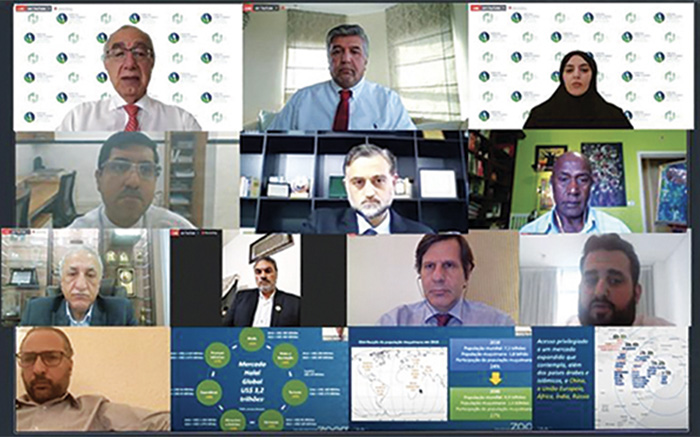Document was signed on Wednesday (10) by the Arab Brazilian Chamber of Commerce president Rubens Hannun and DAFZA director-general Amna Lootah during webinar hosted by the Arab Chamber.
São Paulo – The Arab Brazilian Chamber of Commerce signed a memorandum of understanding (MOU) with the Dubai Airport Free Zone (DAFZA) on Wednesday (10). The document was signed by Arab Chamber president Rubens Hannun and DAFZA director-general Amna Lootah (pictured above) during online conference hosted by the Chamber and attended by 1,000 people.
The agreement was penned during the webinar ‘’Global Halal Market: trends, regulation and opportunities,’ which brought together Brazilian and Arab specialists. The memorandum aims at giving Brazilian companies more information on halal and certificates for products and services fit for Muslim consumption and encouraging them to break into this market through DAFZA, which is Dubai’s second oldest free zone. The entities have worked together in projects such as the Halal Guidebook, which had its first Portuguese version published in 2018 during the Brazil-Arab Countries Economic Forum.Reprodução / Youtube
Hannun believes that the memorandum strengthens the work done with DAFZA
“Our relations with DAFZA have been established over the years. This important initiative adds to others that this MOU will make possible. DAFZA, through the Halal Trade and Marketing Centre (HTMC), and the Arab Chamber will contribute to the growth and development of manufacturers, suppliers and distributors of the halal economy. I’m sure that the members of both will benefit from much reliable information on consumer markets, allowing demands to be met,” Hannun said during the online conference.
DAFZA brings together more than 20 plants and generated a revenue of AED 164 billion for the economy of Dubai, DAFZA director-general Amna Lootah pointed out. “Thinking on Dubai as the world capital of the Islamic economy, we worked hard do develop this strategy focused on some initiatives. One is the Halal Guidebook, which will allow the companies to know more about the market and will take them step by step through the regulations and ecosystem. There are many added value in this guidebook, and we are working with the Arab Chamber to release its second version to be translated into Portuguese, which will be distributed among their members,” Lootah said.Reprodução / Youtube
Memorandum was signed online on Wednesday (10)
The second initiative mentioned by the director is the HTMC, which is a global business development project focused on the halal economy. “Our vision is to attract foreign direct investment. There is a huge opportunity for the companies to come to this region. We focus on the halal and, by having this center, we will give them lots of added value in terms of consultation highlighting the key areas and strengths of each company. Also, we know that there is a huge potential with the Brazilian companies to come, and through Dubai they can serve the majority of Muslim countries. HTMC can play a big role to help them,” Lootah added.
The webinar also featured Prime Group cofounder and managing partner Mohamed M. Saleh Badri; Halal Trade and Marketing Centre (HTMC) manager Tomas Guerrero; Jordanian Society for Organic Farming (JSOF) secretary Ibrahim Abu- Helil; CDIAL Halal president Ali Saifi; Fambras Halal president Mohamed Zohgbi; Alimentos Halal commercial director Nasser Khazraji; Siil Halal executive director Chaiboun Darwiche; and Arab chamber president Rubens Hannun, administrative vice president Mohamad Orra Mourad, and secretary-general Tamer Mansour.
Click below for the full webinar and other articles.
Brazil has potential for diversification in halal market
Halal label stands out even in non-Islamic markets
Translated by Guilherme Miranda
